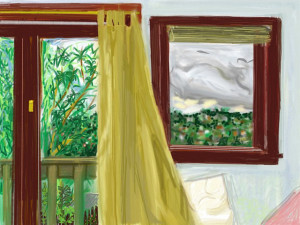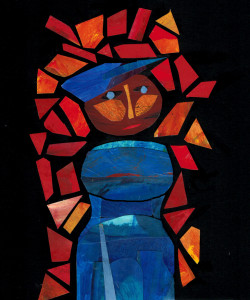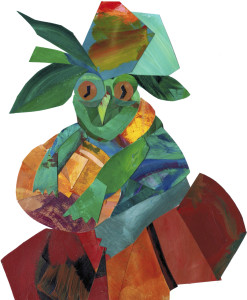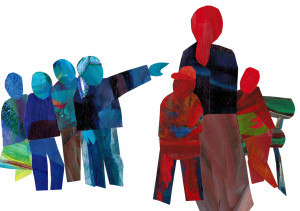[This article contains mature subjects, at around a PG-14 level]
| I am going to make a confession, a personal one, not meant to speak for any other woman: I don’t mind when men tell me to smile. By saying so, I risk denting my feminist credentials. I mention this because of a street art project–recently covered in news sources such as NPR, The Daily Beast, and the New York Times, that operates under the name “Stop Telling Women to Smile.” |
 |
This campaign, organized by an artist and activist, Tatyana Fazlalizadeh, uses posters to confront the “street harassment” that women deal with regularly as we go about our daily lives. Street harassment may include catcalls and whistles, but this project focuses more on men’s inappropriate personal comments to women.
The posters sport crisp black-and-white portraits of women with sober, steadfast gazes, along with concise written messages: My name isn’t Baby. Critiques on my body are not welcome. Women do not owe you for their time or conversation. My outfit is not an invitation. The slogan “Stop telling women to smile” appears under a self-portrait of the artist with her head turned, casting a skeptical eye.
I am 100% behind almost all the messages–the ones pointing out that women are neither “outside for your entertainment” nor in need of validation from strange men. It’s the one about smiling, though, that has me churning, questioning my loyalties, reviewing my own experiences, asking myself where I stand. I have conflicting impulses, wanting to celebrate and at the same time to raise objections to Fazlalizadeh’s work, or at least decry its title (which admittedly makes a nice palindromic acronym: STWTS).
My first thought about the saying is that I don’t want to be that surly. Most of the time, when someone tells me to smile, it feels less like an imposition and more like a reminder. I usually do need to step away from some grim rumination, and it feels easy to me to yield up the requested grin. Also, the flower-child side of me prefers empathy-building “I” statements to outright commands like STOP!
Sometimes, “stop,” though, is what you have to holler. The artist is responding to a whole range of behaviors that are indeed disruptive to female lives. She makes a carefully considered choice to hone in on one that is seemingly harmless, just as a pinch on the behind, an office come-on, or an embarrassingly intense flirtation — “If I weren’t married, I would…” — were once perceived as OK. She argues that when a man prevails on a woman he does not know with personal comments of any kind, he is assuming that he has an innate right to her attention. His actions reinforce the idea that women somehow owe something to men.
Anyone who has come across the notion of men’s dates “putting out” in exchange for dinner, knows that many men do have a sense of entitlement when it comes to women. I briefly dated the poster boy for this attitude, who congratulated himself out loud for not forcing his attentions on me.
And so, as it was designed to do, STWTS got me thinking about the kinds of harassment I myself have suffered. From the time I was a teenager, working in the 1980s as a downtown foot-messenger, I have spent plenty of time on public transportation and on urban streets. This week I pulled together my own collection of unpleasant and even frightening interactions I’ve had with men. Any one of these various stalkings, flashings, and gropings could be shaken off, but together they make such an impression–such a discouraging and R-rated one–that I decided not to include my collection directly in this essay.
Experimentally, I wrote a list of Don’ts, less concise than Fazlalizadeh’s, aimed at my own harassers. For those of you who are comfortable reading about immature acts related to mature subjects, you can find my slogans here. I deployed enough euphemism and innuendo for them to qualify for a PG-14 rating. Perhaps my act of burying mine on a back-page web post will highlight Fazlalizadeh’s courage in putting hers out on walls.
I recognize that I have lived a charmed life, virtually free from physical violence, and that my own experiences with masculine aggression are worlds away from the worst that they could be. (Compare Josie Pickens’ painful reminiscences in Ebony, also sparked by STWTS, about the degree to which men’s remarks normalize physical forms of sexual aggression.)
And some instances of men presuming on my attention are ones that I wouldn’t change, for instance with Florio, 4′ 11″, who followed me through an amusement park trying in various languages to strike up a conversation. When I gave up and answered him, I wound up learning all about his career as a weightlifter in Romania. Then he thanked me for the chat and politely said goodbye.
Then there was my encounter with a guy on the long transbay bus ride from Oakland to San Francisco. I could certainly have come up with some Don’ts for him. Don’t get drunk in the morning on an empty stomach and tell me the whole sad story of your life falling apart. Do not, under any circumstance, start calling me your ‘little support system.’ Do not follow me onto a second, desperately crowded bus, holding forth so loudly and repetitively than no one will sit in the empty seat on the other side of you, then promise you will get off the bus only if I kiss you on the cheek.
Not that I would want to to go through an experience like that again, but still it was worth it for the memory and for the story, and maybe for making my post-college life of house-sitting and unemployment seem relatively respectable and orderly. When I tell the tale, I sometimes leave out the fact that I did kiss the man. He was good as his word, disappearing from my life at the very next stop. I certainly don’t mention that he wasn’t even the only stranger ever I kissed to make go away. It weirds people out, and, in light of Fazlalizadeh’s activism, now feels a bit like a betrayal of feminist ideals.
But there it is. In those days, I was a sucker for strangers. Not once did it occur to me to scowl or tell someone to shove off.
Such incidents tapered off sometime after my 20s. The dew in my eyes evaporated. My appearance changed, and so did my stance. When I made my mid-career shift from writing and editing to teaching, I developed “the look,” a glare that can part crowds, knock a rider from a skateboard, or pacify a late-night shouter on Telegraph Avenue. (“Are you a schoolteacher?” one of them once straightened up and asked me.)
Even now, though, I depend on the intervention of strangers, such as the woman sitting next to me on a plane, who patted my back for fifteen minutes during the landing while I threw up into the airsick bag. Once, over-confident of my teacherly superpowers, I got into a shouting match on the UC Berkeley campus with a man who objected to my walking behind him–20 or 30 feet behind. In retrospect, it’s obvious that he was speaking from the throes of mental illness, but at the time it just didn’t sink in for me.
I was yelling at him that I would walk where I wanted to, when another woman (I have no recall of what she looked like) linked arms with me and led me in the opposite direction, out of this pointless altercation, saying, “Let’s just have a little stroll over this way.”
Like Farzalizadeh, I dream of a world where women can move freely, without fear, even without hassle. Beyond that, I dream of a world men and women can generally count on one another for some spirit of street solidarity. Conceivably, suggesting a smile could be a part of that. But for now, in the world we live in, I have to get behind a woman’s right to just say let me be.







